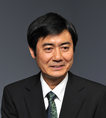Greetings
 On behalf of the SSDM Committees, it is my great pleasure to welcome all of you to the 2025 International Conference on Solid State Devices and Materials (SSDM2025), to be held from September 15 to 18, 2025, in Yokohama, Japan. Since its inception in 1969, SSDM has served as one of leading international conferences, providing a vital forum for active discussions among academia, industry, and government on a wide range of cutting-edge research topics related to solid-state devices and materials, from interdisciplinary domains to emerging fields.
On behalf of the SSDM Committees, it is my great pleasure to welcome all of you to the 2025 International Conference on Solid State Devices and Materials (SSDM2025), to be held from September 15 to 18, 2025, in Yokohama, Japan. Since its inception in 1969, SSDM has served as one of leading international conferences, providing a vital forum for active discussions among academia, industry, and government on a wide range of cutting-edge research topics related to solid-state devices and materials, from interdisciplinary domains to emerging fields.
This year, we received 649 abstract submissions from 15 countries and regions around the world. After a rigorous peer review process by the Program Committee, 286 papers were selected for oral presentations, and 191 papers for short oral and poster presentations.
Two Short Courses will be offered on September 15.
- “Symphony of Circuits and Devices for the AI Era,” organized by Prof. Hiromi Yuasa (Kyushu University), Prof. Kosuke Miyaji (Shinshu University), and Prof. Takeaki Yajima (Kyushu University).
- “State-of-the-Art ULSI technologies: Materials, Processes, Devices, and Integration,” organized by Prof. Osamu Nakatsuka (Nagoya University).
Both courses will feature valuable insights and technical knowledge delivered by leading experts from both academia and industry.
A Special Talk, titled “Human–AI Co‑Evolution Driven by Solid‑State Devices & Materials,” will follow the Short Courses on September 15, delivered by Dr. Kazuo Yano (Hitachi, Ltd.).
The technical sessions begin on September 16 with a Plenary Session, including the SSDM Award Ceremony. We are honored to host three distinguished plenary speakers:
- Prof. Tsutomu Miyasaka (Toin University of Yokohama): “Molecular engineering of interfaces for high performance perovskite solar cells”
- Dr. Myeong-Jae Park (SK hynix): “Present and Future Challenges of HBM”
- Dr. Bruno Le Pioufle (CNRS Office for North-East Asia): “The Science Policy of France and Japan collaboration through CNRS”
Following the Plenary Session, regular sessions will take place over three days, covering 12 technical areas aligned with the SSDM2025 scope. The program includes 50 invited talks, 460 contributed presentations, and 17 late-news presentations. A Poster Session will be held in the late afternoon of September 17, immediately after the parallel short oral sessions for posters.
SSDM is officially sponsored by the Japan Society of Applied Physics. We are also deeply grateful to the many corporations and foundations for their generous support, as listed at: https://www.ssdm.jp/sponsors.html.
I would like to express my sincere appreciation to all the contributors for sharing their latest research results and ideas that make SSDM2025 such a stimulating and exciting event. As technologies rapidly evolve across diverse domains — from generative AI and high-performance computing to quantum information, photonics, and spintronics — the role of solid-state devices and materials has become increasingly essential. The innovations presented at SSDM span a wide range of disciplines, driving progress not only in digital infrastructure but also in sensing, communication, energy, and fundamental physics. By fostering interdisciplinary dialogue, SSDM continues to play a vital role in shaping the future of science and technology.
I hope you enjoy the exciting program and engage in inspiring discussions and fruitful exchanges throughout the conference.
September 2025

Toshiro Hiramoto
Chair, Organizing Committee, SSDM2025
